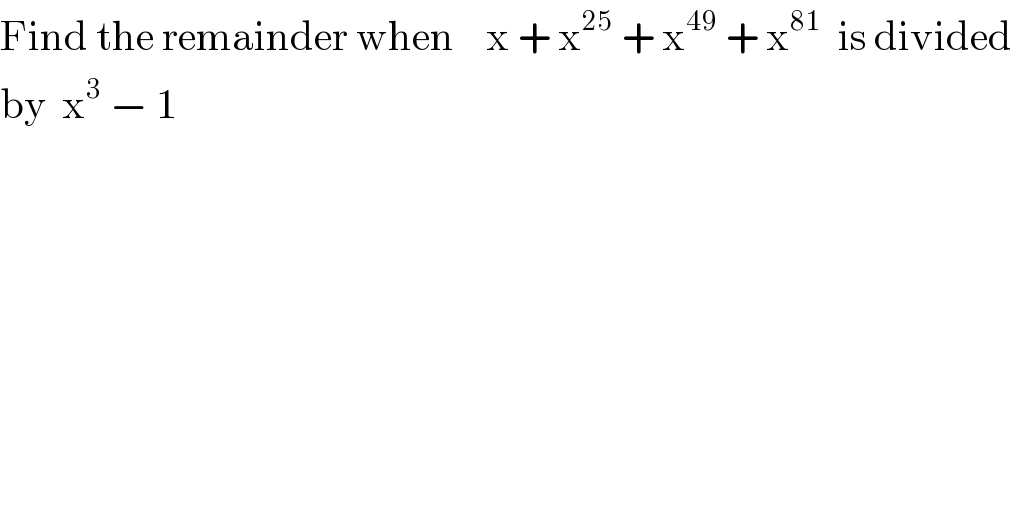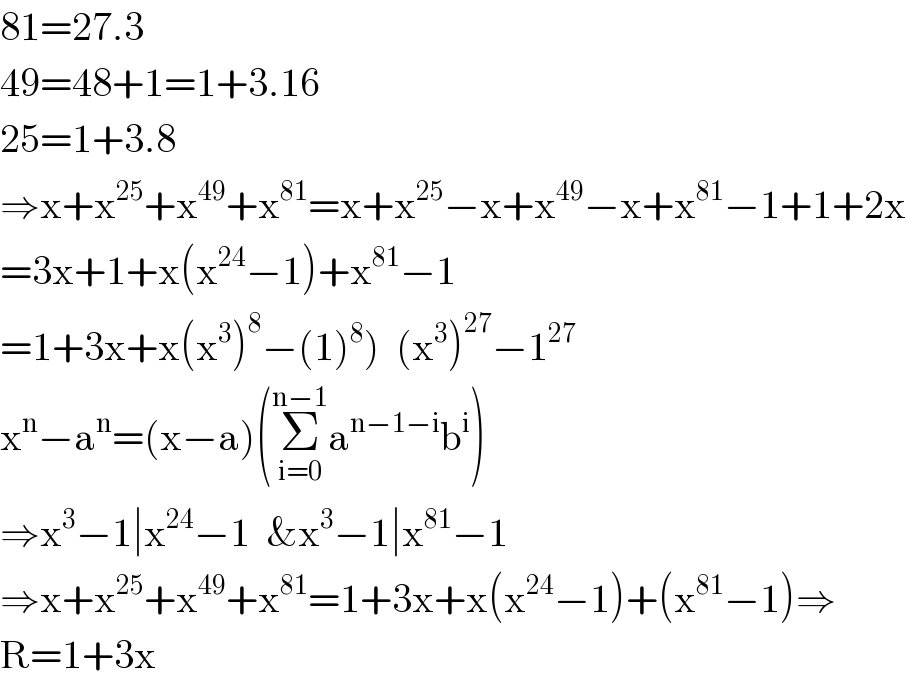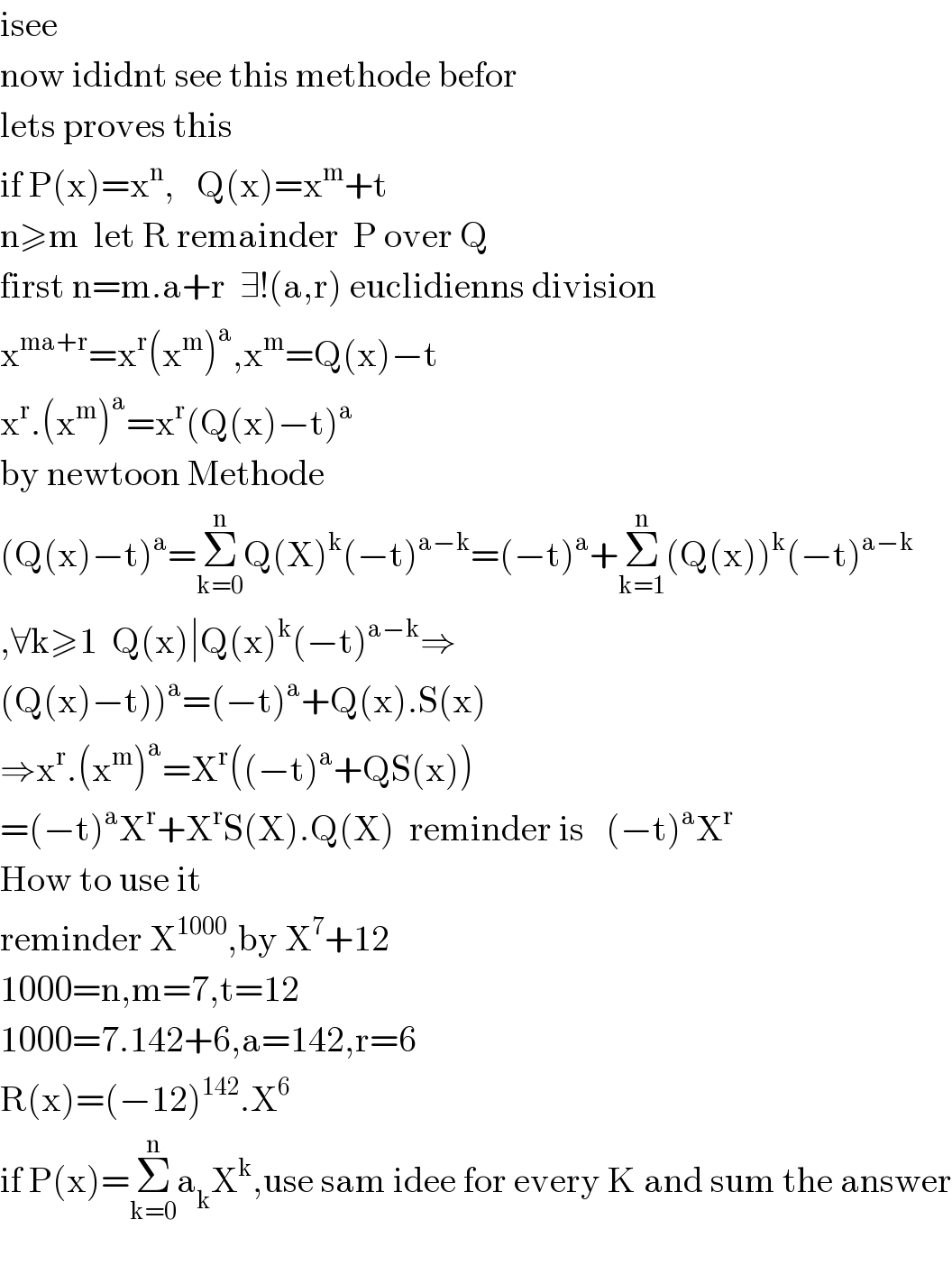Question Number 77655 by TawaTawa last updated on 08/Jan/20

$$\mathrm{Find}\:\mathrm{the}\:\mathrm{remainder}\:\mathrm{when}\:\:\:\:\mathrm{x}\:+\:\mathrm{x}^{\mathrm{25}} \:+\:\mathrm{x}^{\mathrm{49}} \:+\:\mathrm{x}^{\mathrm{81}} \:\:\mathrm{is}\:\mathrm{divided} \\ $$$$\mathrm{by}\:\:\mathrm{x}^{\mathrm{3}} \:−\:\mathrm{1} \\ $$
Commented by jagoll last updated on 08/Jan/20

$${using}\:{Horner}\:{method} \\ $$
Answered by mind is power last updated on 09/Jan/20

$$\mathrm{81}=\mathrm{27}.\mathrm{3} \\ $$$$\mathrm{49}=\mathrm{48}+\mathrm{1}=\mathrm{1}+\mathrm{3}.\mathrm{16} \\ $$$$\mathrm{25}=\mathrm{1}+\mathrm{3}.\mathrm{8} \\ $$$$\Rightarrow\mathrm{x}+\mathrm{x}^{\mathrm{25}} +\mathrm{x}^{\mathrm{49}} +\mathrm{x}^{\mathrm{81}} =\mathrm{x}+\mathrm{x}^{\mathrm{25}} −\mathrm{x}+\mathrm{x}^{\mathrm{49}} −\mathrm{x}+\mathrm{x}^{\mathrm{81}} −\mathrm{1}+\mathrm{1}+\mathrm{2x} \\ $$$$=\mathrm{3x}+\mathrm{1}+\mathrm{x}\left(\mathrm{x}^{\mathrm{24}} −\mathrm{1}\right)+\mathrm{x}^{\mathrm{81}} −\mathrm{1} \\ $$$$\left.=\mathrm{1}+\mathrm{3x}+\mathrm{x}\left(\mathrm{x}^{\mathrm{3}} \right)^{\mathrm{8}} −\left(\mathrm{1}\right)^{\mathrm{8}} \right)\:\:\left(\mathrm{x}^{\mathrm{3}} \right)^{\mathrm{27}} −\mathrm{1}^{\mathrm{27}} \\ $$$$\mathrm{x}^{\mathrm{n}} −\mathrm{a}^{\mathrm{n}} =\left(\mathrm{x}−\mathrm{a}\right)\left(\underset{\mathrm{i}=\mathrm{0}} {\overset{\mathrm{n}−\mathrm{1}} {\sum}}\mathrm{a}^{\mathrm{n}−\mathrm{1}−\mathrm{i}} \mathrm{b}^{\mathrm{i}} \right) \\ $$$$\Rightarrow\mathrm{x}^{\mathrm{3}} −\mathrm{1}\mid\mathrm{x}^{\mathrm{24}} −\mathrm{1}\:\:\&\mathrm{x}^{\mathrm{3}} −\mathrm{1}\mid\mathrm{x}^{\mathrm{81}} −\mathrm{1} \\ $$$$\Rightarrow\mathrm{x}+\mathrm{x}^{\mathrm{25}} +\mathrm{x}^{\mathrm{49}} +\mathrm{x}^{\mathrm{81}} =\mathrm{1}+\mathrm{3x}+\mathrm{x}\left(\mathrm{x}^{\mathrm{24}} −\mathrm{1}\right)+\left(\mathrm{x}^{\mathrm{81}} −\mathrm{1}\right)\Rightarrow \\ $$$$\mathrm{R}=\mathrm{1}+\mathrm{3x} \\ $$
Commented by TawaTawa last updated on 09/Jan/20

$$\mathrm{God}\:\mathrm{bless}\:\mathrm{you}\:\mathrm{sir} \\ $$
Answered by john santu last updated on 09/Jan/20

$${let}\:{p}\left({x}\right)=\:\left({x}^{\mathrm{3}} \right)^{\mathrm{27}} +\left({x}^{\mathrm{3}} \right)^{\mathrm{16}} {x}+\left({x}^{\mathrm{3}} \right)^{\mathrm{8}} {x}+{x} \\ $$$${now}\:{substitute}\:{x}^{\mathrm{3}} =\mathrm{1} \\ $$$${R}\left({x}\right)\:=\:\mathrm{1}+{x}+{x}+{x}\:=\:\mathrm{3}{x}+\mathrm{1} \\ $$$${this}\:{answer}.\: \\ $$
Commented by mind is power last updated on 09/Jan/20

$$\mathrm{isee}\: \\ $$$$\mathrm{now}\:\mathrm{ididnt}\:\mathrm{see}\:\mathrm{this}\:\mathrm{methode}\:\mathrm{befor} \\ $$$$\mathrm{lets}\:\mathrm{proves}\:\mathrm{this} \\ $$$$\mathrm{if}\:\mathrm{P}\left(\mathrm{x}\right)=\mathrm{x}^{\mathrm{n}} ,\:\:\:\mathrm{Q}\left(\mathrm{x}\right)=\mathrm{x}^{\mathrm{m}} +\mathrm{t} \\ $$$$\mathrm{n}\geqslant\mathrm{m}\:\:\mathrm{let}\:\mathrm{R}\:\mathrm{remainder}\:\:\mathrm{P}\:\mathrm{over}\:\mathrm{Q} \\ $$$$\mathrm{first}\:\mathrm{n}=\mathrm{m}.\mathrm{a}+\mathrm{r}\:\:\exists!\left(\mathrm{a},\mathrm{r}\right)\:\mathrm{euclidienns}\:\mathrm{division} \\ $$$$\mathrm{x}^{\mathrm{ma}+\mathrm{r}} =\mathrm{x}^{\mathrm{r}} \left(\mathrm{x}^{\mathrm{m}} \right)^{\mathrm{a}} ,\mathrm{x}^{\mathrm{m}} =\mathrm{Q}\left(\mathrm{x}\right)−\mathrm{t} \\ $$$$\mathrm{x}^{\mathrm{r}} .\left(\mathrm{x}^{\mathrm{m}} \right)^{\mathrm{a}} =\mathrm{x}^{\mathrm{r}} \left(\mathrm{Q}\left(\mathrm{x}\right)−\mathrm{t}\right)^{\mathrm{a}} \\ $$$$\mathrm{by}\:\mathrm{newtoon}\:\mathrm{Methode} \\ $$$$\left(\mathrm{Q}\left(\mathrm{x}\right)−\mathrm{t}\right)^{\mathrm{a}} =\underset{\mathrm{k}=\mathrm{0}} {\overset{\mathrm{n}} {\sum}}\mathrm{Q}\left(\mathrm{X}\right)^{\mathrm{k}} \left(−\mathrm{t}\right)^{\mathrm{a}−\mathrm{k}} =\left(−\mathrm{t}\right)^{\mathrm{a}} +\underset{\mathrm{k}=\mathrm{1}} {\overset{\mathrm{n}} {\sum}}\left(\mathrm{Q}\left(\mathrm{x}\right)\right)^{\mathrm{k}} \left(−\mathrm{t}\right)^{\mathrm{a}−\mathrm{k}} \\ $$$$,\forall\mathrm{k}\geqslant\mathrm{1}\:\:\mathrm{Q}\left(\mathrm{x}\right)\mid\mathrm{Q}\left(\mathrm{x}\right)^{\mathrm{k}} \left(−\mathrm{t}\right)^{\mathrm{a}−\mathrm{k}} \Rightarrow \\ $$$$\left.\left(\mathrm{Q}\left(\mathrm{x}\right)−\mathrm{t}\right)\right)^{\mathrm{a}} =\left(−\mathrm{t}\right)^{\mathrm{a}} +\mathrm{Q}\left(\mathrm{x}\right).\mathrm{S}\left(\mathrm{x}\right) \\ $$$$\Rightarrow\mathrm{x}^{\mathrm{r}} .\left(\mathrm{x}^{\mathrm{m}} \right)^{\mathrm{a}} =\mathrm{X}^{\mathrm{r}} \left(\left(−\mathrm{t}\right)^{\mathrm{a}} +\mathrm{QS}\left(\mathrm{x}\right)\right) \\ $$$$=\left(−\mathrm{t}\right)^{\mathrm{a}} \mathrm{X}^{\mathrm{r}} +\mathrm{X}^{\mathrm{r}} \mathrm{S}\left(\mathrm{X}\right).\mathrm{Q}\left(\mathrm{X}\right)\:\:\mathrm{reminder}\:\mathrm{is}\:\:\:\left(−\mathrm{t}\right)^{\mathrm{a}} \mathrm{X}^{\mathrm{r}} \\ $$$$\mathrm{How}\:\mathrm{to}\:\mathrm{use}\:\mathrm{it}\: \\ $$$$\mathrm{reminder}\:\mathrm{X}^{\mathrm{1000}} ,\mathrm{by}\:\mathrm{X}^{\mathrm{7}} +\mathrm{12} \\ $$$$\mathrm{1000}=\mathrm{n},\mathrm{m}=\mathrm{7},\mathrm{t}=\mathrm{12} \\ $$$$\mathrm{1000}=\mathrm{7}.\mathrm{142}+\mathrm{6},\mathrm{a}=\mathrm{142},\mathrm{r}=\mathrm{6} \\ $$$$\mathrm{R}\left(\mathrm{x}\right)=\left(−\mathrm{12}\right)^{\mathrm{142}} .\mathrm{X}^{\mathrm{6}} \\ $$$$\mathrm{if}\:\mathrm{P}\left(\mathrm{x}\right)=\underset{\mathrm{k}=\mathrm{0}} {\overset{\mathrm{n}} {\sum}}\mathrm{a}_{\mathrm{k}} \mathrm{X}^{\mathrm{k}} ,\mathrm{use}\:\mathrm{sam}\:\mathrm{idee}\:\mathrm{for}\:\mathrm{every}\:\mathrm{K}\:\mathrm{and}\:\mathrm{sum}\:\mathrm{the}\:\mathrm{answer} \\ $$$$ \\ $$
Commented by john santu last updated on 09/Jan/20

$${let}\:{f}\left({x}\right)=\:{x}^{\mathrm{1000}} =\left({x}^{\mathrm{7}} \right)^{\mathrm{142}} ×{x}^{\mathrm{6}} \\ $$$${now}\:{substitute}\:{x}^{\mathrm{7}} =−\mathrm{12} \\ $$$${now}\:{R}\left({x}\right)=\:\left(−\mathrm{12}\right)^{\mathrm{142}} ×{x}^{\mathrm{6}} \\ $$
Commented by TawaTawa last updated on 09/Jan/20

$$\mathrm{God}\:\mathrm{bless}\:\mathrm{you}\:\mathrm{sir} \\ $$
